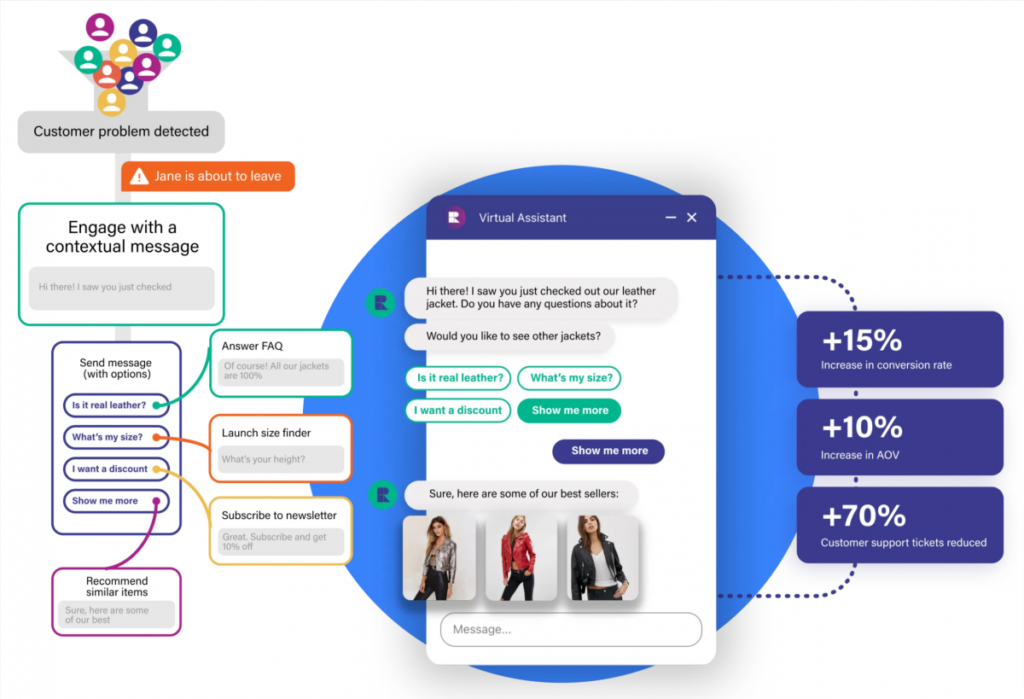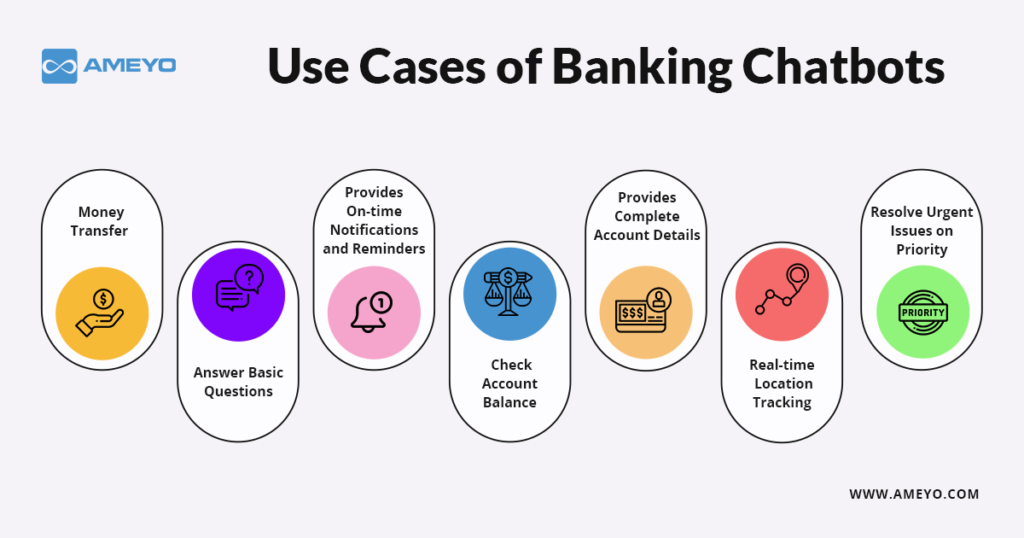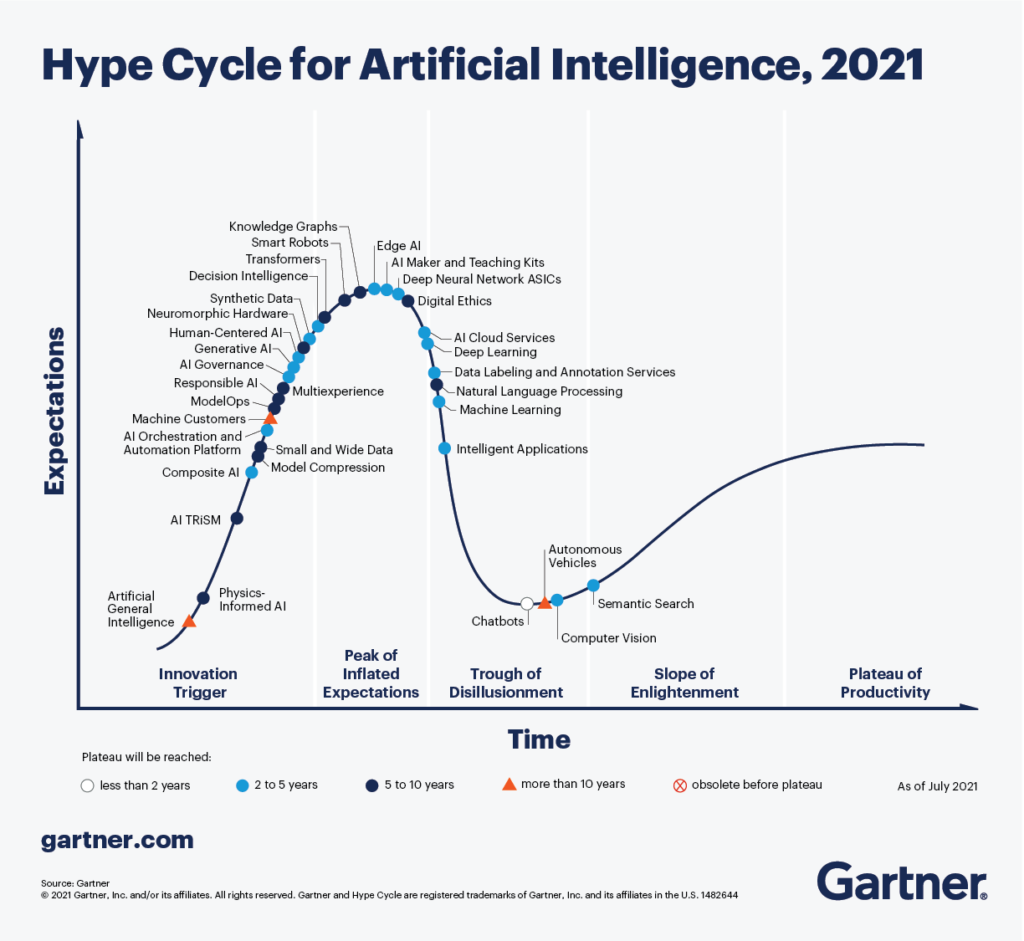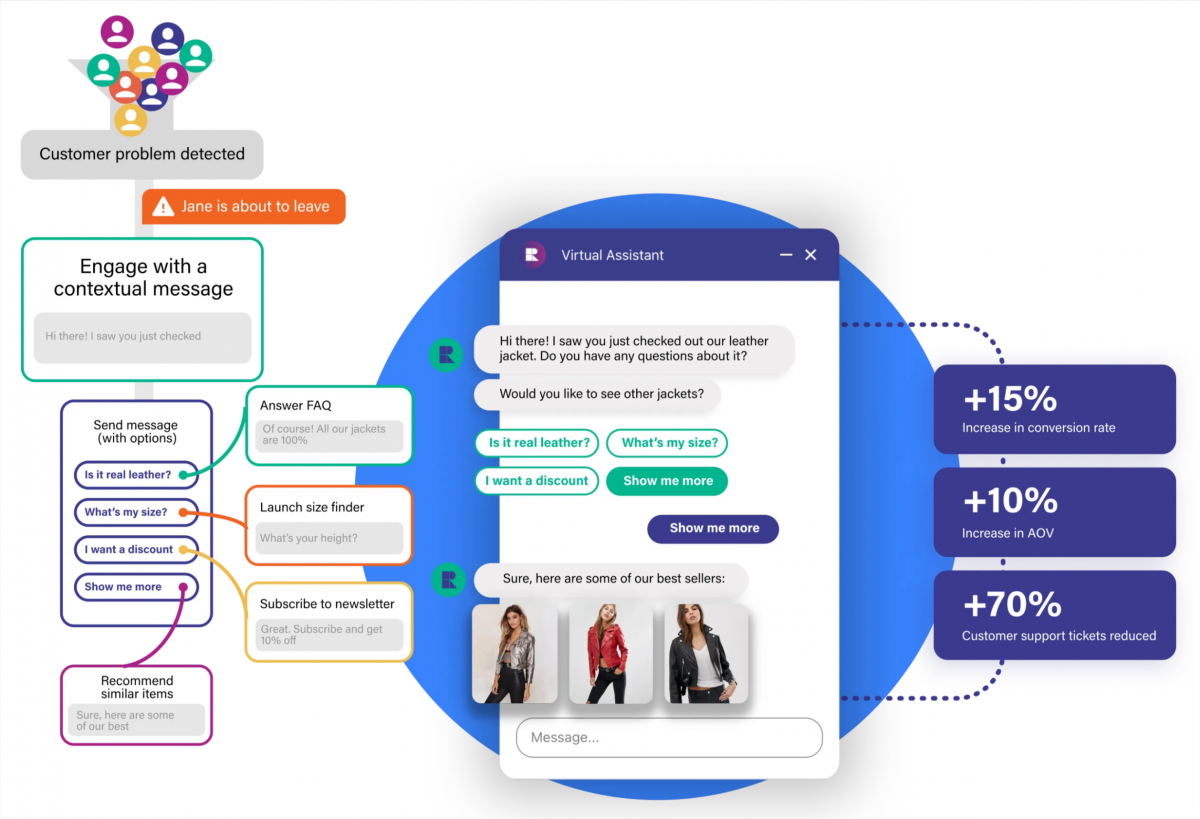Introduction to AI Trends
AI (Artificial Intelligence) is increasingly becoming an indispensable tool in our daily lives, influencing various sectors from the finance industry to the world of online business. As we dive deeper into this digital age, I believe it’s crucial that we understand the current AI trends and how they’re shaping our world.
Understanding AI
To fully grasp the impact of AI, we first must understand what it is. AI, or artificial intelligence, is a branch of computer science striving to build or create machines capable of performing tasks that would normally require human intelligence. These tasks include learning, problem-solving, recognizing speech, and so on. Computer algorithms and systems learn from experience, much like how we humans do, making them increasingly accurate in their tasks as time progresses.
The influence of AI in online business
Now, let’s turn our attention to the world of online businesses. AI has become a game-changer in this sector, acting as an invaluable tool for many companies. One significant impact has been the advent of chatbots. These AI-powered software act as digital assistants, offering 24/7 customer service, and can handle numerous queries simultaneously – effectively reducing the need for human customer service representatives.
AI’s impact doesn’t end there. It is also revolutionizing cash flow management with accurate financial forecasting, thus allowing businesses to make effective and data-driven decisions. AI’s ability to analyze vast amounts of data swiftly and accurately enables it to predict future trends, providing businesses with crucial insights for strategic planning.
In my view, understanding AI trends is vital. It enables us to not only keep up with the rapidly changing digital landscape but also to leverage AI’s immense potential in various sectors. From chatbots to accurate financial forecasts, AI is here to stay and will continue transforming our world in ways we can hardly imagine.
The Move towards Chatbots
The business landscape has been revolutionized with the advent of Artificial Intelligence (AI), particularly with its application in the form of chatbots. If we take a look at the evolution of chatbots, we can see a shift in business customer service and how AI impacts financial matters, thus, driving revenue.
Evolution of Chatbots
Ever since their inception, chatbots have unfolded themselves beyond the expectations of many businesses. It all began with a simple command-response mechanism, which has now evolved into sophisticated AI-powered bots capable of personalizing responses and offering solutions within seconds. Imagine a world where your customers don’t have to wait for an available customer service representative. Instead, a chatbot attends them, understands their issues, and offers immediate solutions. That’s the power of AI in today’s business world.
Chatbots improving customer service
Today, chatbots play a pivotal role in maintaining and even improving the standards of customer service in businesses. With their ability to work 24/7 with no lapses, chatbots have surpassed their human counterparts in terms of availability, efficiency, and even accuracy. Today’s chatbots are hard to distinguish from humans, equipped with the ability to understand sentiments, chatbot conversations have become more human-like, thus, gratifying customer experience.
From Chatbots to Cash Flow
Turning our focus from chatbots to finance, the impact of AI becomes more appreciable. The ingenious use of AI within financial departments has seen tremendous improvements in monetary handling. With AI, recurring financial jobs such as invoice processing have become automated, saving time and eliminating risks of errors. Moreover, AI’s predictive analysis capabilities have made financial forecasting more precise, making business more profitable.
These are a few ways AI is proving to be a game-changer in the business ecosystem. From chatbots enhancing customer service to automated financial operations, AI’s progressive impact is rewarding businesses with improved cash flow.
Understanding AI Trends: From Chatbots to Cash Flow
In today’s online business landscape, Artificial Intelligence (AI) is not just a buzzword, but a game-changer that’s revolutionizing how businesses operate. AI has become increasingly important in monetizing online businesses in several ways. From chatbots that boost sales to machine learning algorithms that enhance user experience to AI-powered tools that improve cash flow, the scope of AI in growing online businesses is vast.
Increased Sales Through Personalized Recommendations
Firstly, one way AI boosts sales is by providing personalized recommendations. I’ve seen it to be really effective. Say, for example, you’re an online bookstore. An AI algorithm studies your customers’ buying patterns, their preferences, the books they’ve viewed but didn’t buy, etc. Based on these parameters, it’s able to predict what books they’re likely to buy and provide relevant recommendations. This hyper-personalization not only increases the chances of sales but also makes the shopping experience more convenient for customers, leading to customer loyalty and repeat purchases.
Improved User Experience
Secondly, there’s no doubt that a positive user experience goes a long way in enhancing customer retention and ultimately boosting sales. AI has a significant role to play here too. With AI, businesses can analyze mountains of user data to understand user behavior better and create more engaging and intuitive interfaces. For instance, AI-powered chatbots can handle simple tasks, answer common questions, and handle multiple customers simultaneously, leading to quicker resolution of customer issues and ultimately, happy customers.
AI trends continue to evolve and push the envelope in various aspects of online businesses. With its ability to analyze large datasets and predict behavior, AI is indeed playing a big role in transforming customer interactions, improving business performance, and ultimately driving sales and revenue growth.
This image is property of miro.medium.com.
The Link between Chatbots and Cash Flow
Chatbots are synonymous with Artificial Intelligence. As they have become a common feature in the business landscape, it’s critical to understand the ways they can significantly impact your business’s bottom line or cash flow.
How Chatbots Can Impact Revenues
A proficiently designed chatbot can streamline customer interactions in several ways. Firstly, it offers 24/7 service, ensuring no customer query goes unanswered. Second, chatbots can handle multiple customer interactions simultaneously. This ability cuts costs as it reduces the need for vast customer service teams.
Additionally, chatbots can subtly direct customers towards availing more services or products, thereby increasing sales. Hence, they have a direct impact on increasing revenues and improving the business’s cash flow dynamics.
Case Studies of Successful Chatbot Implementation
To further illustrate the point, let’s delve into a few instances where businesses have successfully implemented chatbots for financial gains. A classic example is the use of ‘GIA’ by Wall Street Journal. This AI chatbot provided push notifications about financial news to subscribers and lead to a 172% increase in user engagement in just a month, positively affecting the revenues.
Another successful implementation is the ‘AI Fitness Coach’ by a fitness company called ‘Dave’. The personal trainer chatbot upsold nutritional supplements to the users leading to a 28% increase in revenue per user.
To wrap up, as AI technologies continue to grow and evolve, their effect on businesses is likely to be transformative. As digital communication increasingly becomes the norm, chatbots will evolve from being a revolutionary technology to an essential business tool. Understanding this connection between AI, specifically chatbots, and cash flow, businesses can optimize their operations, cut down costs, and escalate their revenues.

This image is property of digitalskillsglobal.com.
AI trends have been progressively permeating different industries and sectors, and none more so than in the realm of financial management – from chatbots to cash flow projections, AI is truly reshaping the landscape. As I delve into this topic, I will zoom in on two key areas where AI has made a significant impact — budgeting and forecasting, and fraud detection.
AI in Budgeting and Forecasting
Imagine being able to rely on AI to accurately predict your business’ financial outlook and give you a detailed aid in planning your fiscal strategy. It’s no longer a futuristic scenario but the reality for many businesses today. AI has brought a paradigm shift in budgeting and forecasting, revolutionizing the traditional methods. AI algorithms can analyze huge datasets in real-time, providing businesses with timely and precise predictions, identifying trends, and helping in making informed financial decisions. Moreover, AI technologies are able to learn from past data and continually refine their forecasting accuracy as more data is accumulated.
AI and Fraud Detection
In addition to aiding budgeting and forecasting, AI has armed businesses with potent tools for fraud detection. AI systems can scrutinize thousands of transactions in a matter of seconds, flagging anomalies and identifying potential fraudulent activities with greater speed and accuracy than ever before. Through machine learning, these systems adapt and improve over time, becoming even more effective at distinguishing fraudulent actions from legitimate ones. Thus, the integration of AI into financial management not only streamlines various processes but also mitigates risk and safeguards the financial health of companies.
As you can see, the trend of integrating AI into financial management is not merely about keeping up with technological advancements – it’s about optimizing business performance and ensuring financial stability.

This image is property of ecommercefastlane.com.
Potential Challenges When Implementing AI
We all know one fact very well – AI technology is radically shaping our future. Its significant influence can be seen everywhere, from our daily-use smartphones to the functioning of large businesses and corporations. But just like all technologies, AI implementation also brings its own share of challenges.
Ethical Implications
The first issue I’d like to address is the Ethical implications. As AI moves into various sectors of society, ethical concerns have grown exponentially. One of the most common worries is about the fairness in decision-making of AI systems. Without careful planning and regulation, there’s a risk that AI systems might reinforce existing biases or develop their own, which can lead to unfair outcomes.
Technical Challenges
The second hurdle in implementing AI is the technical challenges. Developing AI requires not just advanced hardware but also complex software capable of simulating human intelligence in a machine. This demands a high level of expertise and considerable resources, which can be a barrier for many businesses, especially startups and small enterprises.
Lack of Understanding and Trust
Last but definitely not the least is the lack of understanding and trust in AI technology. Like any emerging technology, AI tends to be shrouded in a lot of misconceptions and misunderstanding. This creates a lack of trust, further hindering its acceptance and implementation. Businesses need to invest in awareness programs and guide their teams through the transformation, facilitating a smooth transition to AI-enabled operations.
It’s clear that while implementing AI can deliver immense benefits, it comes with its own set of challenges. However, with enough awareness, investment, and careful planning, we can confidently navigate these hurdles.
Overcoming the Hurdles
In our journey of understanding AI trends, it’s essential not to overlook the challenges we may face. Just as the use of AI tools like chatbots promises a significant return through improved customer engagement and sales, navigating around potential hurdles like lack of awareness about AI and complex regulatory standards is a must.
Education and Awareness about AI
I have found, in my experiences, that one of the first hurdles businesses face is the lack of education and lack of awareness about AI. You may have heard about AI, its potential in streamlining operations and increasing cash flow, yet you are unsure as to how to implement it effectively in your business. This lack of knowledge can lead to misguided AI strategies and significant revenue losses. Therefore, it’s crucial to invest in availing training resources, attending AI webinars, reading case studies, etc., to remove any misconceptions and have a clear strategy of how to use AI beneficially.
Regulations and Standards in AI
Next, navigating through the complex web of regulations and standards in AI is another hurdle that we need to address. Fluctuating global AI policies, varying from country to country, can make international operations complicated. Furthermore, privacy concerns, data security, transparency and accountability pose additional challenges that need to be considered. It’s crucial to stay updated about AI legislation, invest in lawful and ethical data practices, protect customer data and focus on building trust with customers while using AI tools.
Overcoming these hurdles doesn’t happen overnight. Trust me, I’ve been there. But, with the right knowledge, strategy and dedication, incorporating AI technologies into your business can quite literally pay off.
Future of AI in Online Business
As an enthusiast in the field of Artificial Intelligence (AI), I am fascinated by the transformative power AI has on businesses. It is a field that is rapidly advancing, and every day new developments continue to reshape various industries, online businesses being no exception. Specifically, the emergence of AI-powered chatbots has revolutionized customer service while the concept of leveraging AI for improved cash flow is gaining traction.
Predictions for AI and Chatbots
Chatbots, AI-powered software designed to interact with humans in their natural languages, are usually converse via auditory or textual methods, effectively automating and enhancing the customer service experience. But what does the future hold for this technology? Considering the current trend, chatbots might soon be able to understand not just what the customer is saying, but also the underlying emotions and sentiments. They may be able to personalize interactions, offering a unique experience to each user according to their preferences and behaviors. This could profoundly change the dynamics of online customer service and pave the way for businesses to form deeper relationships with their customers.
Expected Advancements in AI
As for expected advancements in AI, there is a clear shift toward making AI more business-oriented. An area where this shift is evident is in finance, where AI is leveraged to improve cash flow. By predicting and analyzing expenditure and income patterns, AI can help businesses maintain a healthy and steady cash flow. Furthermore, AI algorithms may soon play a role in decision-making procedures, risk assessment, and opportunity evaluation, enabling businesses to make more informed financial decisions.
The world of AI is subtle, fascinating, and continually evolving. As we navigate through its implications, we can surely say that its transformative power is still unfolding, providing intriguing potential for the future of online business.

This image is property of www.ameyo.com.
The fascinating world of AI never seems to cease with its innovations. Today, I want to specifically delve into how businesses are leveraging AI, from chatbots to the impacts on cash flow, to drive increased profits and improved customer experiences.
Businesses that have benefited from AI
AI adoption across various sectors has been astronomical. Whether it’s the financial sector utilizing AI for risk assessment and fraud detection, or the healthcare industry for diagnosing diseases, the benefits are very tangible. I’ve come across a handful of inspiring case studies, such as how Starbucks uses AI to personalize recommendations for their customers, or how Sephora’s chatbot aids customers in finding the perfect products – all in real-time. It’s impressive to see how these brands have successfully incorporated AI into their business strategies and achieving remarkable customer engagement in return.
Studies on AI’s impact on cash flow
Apart from improved customer engagement, it’s interesting to see the profound effect AI has on the bottom line. Recent reports show that businesses utilizing AI technologies have seen a significant improvement in their cash flow. These businesses argue that AI technologies allow them to optimize sales, improve efficiency in their supply chain, and reduce operational costs – all of which contribute to a healthier cash flow. Using AI for predictive analysis also helps companies to forecast revenue accurately, allowing them to make better strategic decisions.
AI has certainly shifted from being an ambitious concept to something that holds very real benefits for businesses. As they continue to unlock its potential, it becomes increasingly clear that AI is more than just a trend – it’s the future of business. However, adopting AI is not without its challenges and businesses must be strategic and deliberate in their implementation to reap the full rewards of this transformative technology.

This image is property of xatkit.com.
In today’s ever-evolving digital landscape, artificial intelligence (AI) continues to profoundly impact various sectors, particularly online businesses. Numerous AI trends are emerging, and among these, two noteworthy trends are Chatbots and Cash Flow prediction models. Both heavily influence how businesses operate and shape their future, defining a new frontier of efficiency and profitability. In this post, we will delve into the business benefits of embracing these AI trends and explore how they can help achieve cost efficiency and improved customer relationships.
Cost Efficiency
When it comes to running an online business, one paramount factor is cost-efficiency, and luckily, AI presents a myriad of opportunities to achieve it. AI-powered Chatbots, for instance, can handle customer service interactions, saving manpower and reducing operational costs substantially. These digital assistants can interact with customers, answer queries instantaneously, and provide information around the clock.
Moreover, predictive analytics powered by AI can forecast business cash flow trends. This ability to predict accurately and make informed business decisions can drastically reduce financial risks. It enhances preventive measures against a possible cash flow crisis, making business operations smoother and more cost-efficient.
Improved Customer Relations
Besides offering business cost efficiency, AI, especially through Chatbots, significantly enhances customer relations. Chatbots offer immediate responses, resolving customer queries faster and reducing waiting time. This immediate response creates a better user experience, facilitating improved customer relationships, and fostering brand loyalty.
AI-driven predictive analytics models also contribute to customer satisfaction indirectly. By accurately predicting cash flow trends, they empower businesses to make strategic decisions that might affect their clientele. Be it launching a new product, running promotional campaigns, or scaling operations; these predictions allow for steady cash flow, ensuring that businesses can timely meet their customer requirements.
To put it plainly, AI is paving the way for more proficient, cost-efficient, and customer-friendly online businesses. Whether through interactive chatbots or smart cash flow management models, it’s clear that adopting AI trends can bring out untold benefits for businesses, scaling new heights of growth and profitability.
Conclusion
Throughout this exploration of the powerful impact of artificial intelligence (AI) on online business, we’ve come across various ways in which AI is not only redefining customer experiences but also influencing cash flows.
The importance of Understanding AI Trends
Understanding AI trends is no longer just a theoretical concept or a tech geek’s playground. It has become a necessity for any business that wants to remain relevant moving forward. The use of chatbots, for example, isn’t a fancy tech-savvy addition to the business; it’s a strategic move towards automating customer interactions, providing speedy responses, and consequently, building customer loyalty. These intelligent virtual assistants can operate 24/7, answering queries, guiding towards purchases, and even troubleshooting, which gives businesses a high return on investment.
Furthermore, it’s not only about enhancing customer interaction; AI is playing a pivotal role in dissecting complex data and unveiling profitable investment insights. The financial alchemy created by AI not only optimizes operational efficiency but also significantly improves cash flow management.
What the future holds for AI in online business
As we move towards the future, the capabilities of AI in the online business landscape will only grow. There’s the promise of smarter, more perceptive chatbots that can hold natural conversations with customers, and more refined AI models that can accurately predict market trends, customer behaviors, and business growth paths. While the journey towards a fully automated business world might be long and paved with challenges, it presents a fascinating picture of possibilities that can redefine the rules of competition and success in business.
Embracing AI no longer remains an option, it is becoming an integral part of how we will conduct business in the future. It truly is an exciting time, and we should all brace ourselves for the transformative wave of AI. Rest assured, the future of online business seems to be in very capable, artificially intelligent hands.

